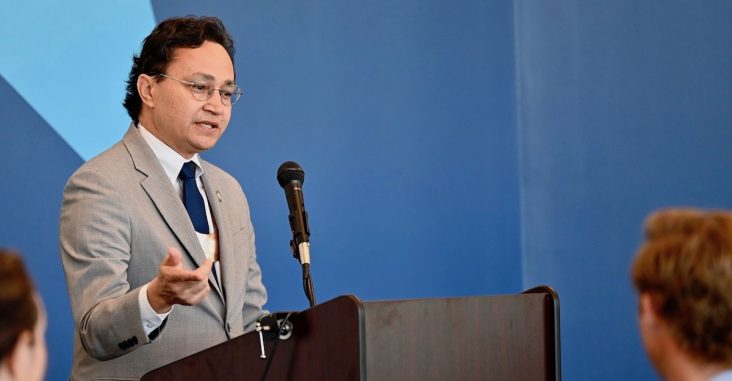Cherokee Freedmen touring exhibit opens at the U.S. Marshals Museum
by May 12, 2024 11:12 am 619 views

Cherokee Nation Principal Chief Chuck Hoskin Jr., speaks during the opening of the Cherokee Freedmen exhibit at the U.S. Marshals Museum.
The U.S. Marshals Museum is the third location for a touring exhibit created by the Cherokee Nation that focuses on the tribe’s “painful moments” with slavery, especially with the Cherokee Freedmen.
“We Are Cherokee: Cherokee Freedmen and the Right to Citizenship,” features the stories, history, images and documents of Cherokee Freedmen, alongside original artworks by Cherokee Nation artists. The special exhibit opened May 11 at the museum, which is located at 789 Riverfront Drive in downtown Fort Smith.
The special exhibit is presented as part of the Cherokee Freedmen Art and History Project initiative, established by Cherokee Nation Principal Chief Chuck Hoskin Jr., to broaden Cherokee Nation’s understanding of the Cherokee Freedmen experience and ensure that it is included in the greater narrative of Cherokee history.
“Every nation gains strength from embracing its entire narrative – triumphs, tragedies and difficult chapters. Cherokee history is no different,” Chief Hoskin said in a statement. “To honor our history fully, we have confronted all aspects of our past, including acknowledging painful moments, like the enslavement of others by our ancestors. By recognizing and sharing these chapters, we make our tribal nation stronger for the future. This historic exhibition, which is traveling for the first time beyond Oklahoma, tells the remarkable resilience of Cherokee Freedmen amid generations of adversity. That spirit is a bond that unites us as Cherokees today.”
According to the Cherokee Nation, the Freedmen experience is shared from Cherokee people’s earliest known participation in slavery in the 18th century on through various historical milestones in the decades that followed, including the adoption of plantation-style slavery among Cherokees, Indian Removal to the West and the American Civil War. It also shares how the Treaty of 1866 granted freed slaves in Cherokee Nation the same rights as native Cherokees. The Oklahoma Historical Society estimates that up to 10,000 were enslaved in what was then Indian Territory.
In her 2015 research paper, “Cherokee Freemen and the Color of Belonging,” Southern Methodist University scholar Lolita Buckner Inniss, noted that the Cherokee at one time had large plantations.
“The Cherokee were once among the wealthiest of the North American aboriginal groups and
sometimes owned large plantations. Like many white plantation owners in the early nineteenth century, many Cherokee relied upon black slave labor to cultivate their lands,” Inniss noted in the report published by the SMU Dedman School of Law. “When the Cherokee were expelled from the southeast United States by the federal government, some of them took their slaves with them on the long, brutal march known as the Trail of Tears. By the 1820s, slavery had become far more common among the Cherokee and was, according to one observer, ‘a cornerstone of Cherokee progressive society.’”
The exhibit examines steps taken by the tribe to strip Freedmen and their descendants of tribal citizenship and examines the 2017 U.S. District Court ruling that upheld the Treaty of 1866 and reaffirmed Cherokee Freedmen as citizens of the Cherokee Nation.
“It is an honor to partner with Cherokee Nation to host this special exhibit at the U.S. Marshals Museum,” said Dr. Terisa Riley, chair of the board of directors for the U.S. Marshals Museum and chancellor at University of Arkansas at Fort Smith. “This timely exhibit is a profoundly brave and illuminating display that should challenge all of us to reckon with the history of enslaved people and of our collective humanity.”
The exhibit first debuted in Tahlequah at the Cherokee National History Museum in 2022, with a narrative about the fight Cherokee Freedmen endured to take back their treaty-protected right to Cherokee Nation citizenship. It then went on to 101 E. Archer in downtown Tulsa in cooperation with the University of Tulsa’s Oklahoma Center for the Humanities.
Admission to the museum is $15 for adults, $13 for seniors 65 and older, and $8 for youth ages 6-17 and college students with photo ID. Children under 6 years old, current military, law enforcement and U.S. marshals receive free admission.
